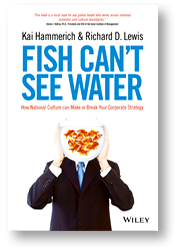
Fish Can’t See Water:
How National Culture Can Make or Break Your Corporate Strategy
Kai Hammerich was born in Denmark, educated at Kellogg and has worked around the globe, living for the last 14 years in England.
This international experience helped inform his book, Fish Can’t See Water: How National Culture Can Make or Break Your Corporate Strategy, published in September 2013 by John Wiley & Sons. The book, written with linguist Richard D. Lewis, looks at the role of culture in international collaborations and challenges the conventional wisdom that says a global economy will create a global way of doing business.
"What we are saying in our book is, ‘Wait a minute. That’s not the world we see developing,’" Hammerich said following a February presentation to Kellogg students. "What we see developing is that with their success, emerging-market companies are gaining self-confidence. Chinese companies are actually becoming more Chinese. On the surface, they’re international and global, but inside in the way they view the world, they’re very Chinese. And the same with Korean companies, the same with Japanese companies, the same with Brazilian companies."

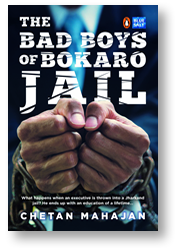
The Bad Boys Of Bokaro Jail
Imagine taking a job as a manager with Everonn, an Indian educational company offering IT training courses. Two months into your new job, teachers at your regional branch in Bokaro quit en masse and join a competitor, leaving students and parents uncertain about the school’s future. They demand refunds. Your senior management sends you from Delhi to Bokaro to clear up the situation.
Two days after your arrival, you are arrested on fraud charges and thrown in jail. You end up spending more than a month behind bars before the charges are dropped. What do you do next?
Chetan Mahajan took his unfortunate incarceration as an opportunity to write about the differences — and similarities — between corporate India and the Indian prison system.
"Going to jail comes with taboos, and many would be embarrassed about it," Mahajan said. "I chose to air my experiences as loudly and publicly as I could."
His new nonfiction book, The Bad Boys of Bokaro Jail, details his life on the inside and reflects on how it has influenced his management thinking.
"The power of the profit motive as a driver of behavior comes through" in both environments, said Mahajan. "But in a framework with ethics, morals and the law, it becomes benign business rather than cops making money from inmates."
Mahajan watched as his company failed to take ownership of a crisis situation — a manager who had been wrongly jailed. "My employer expressed a lot of intent," Mahajan said. "It faltered badly on execution. I don’t think most companies plan for events like this and that’s exactly where they get blindsided. I think having a formal process to manage such contingencies is a must."

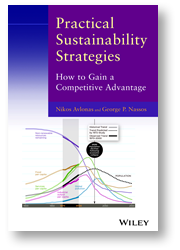
Practical Sustainability Strategies:
How to Gain a Competitive Advantage
George P. Nassos spent 32 years in the corporate world before turning his attention to promoting and teaching new approaches to sustainability in companies. Written with Nikos Avlonas, Nassos’ new book, Practical Sustainability Strategies, incorporates research Nassos developed while teaching a course in the M.S. in Environmental Management and Sustainability program at Illinois Institute of Technology’s Stuart School of Business.
Nassos identifies strategies companies can use to develop, maintain or extend a competitive advantage without having a negative impact on the environment. The book also describes sustainability measurement techniques for companies.
Some of the book’s strategies are based on broader principles that can be applied across industries. Other strategies are specific to manufacturing or service companies. One of the strategies converts a company from manufacturing to service by selling the function of the product rather than the product to reduce the use of natural resources and eliminate waste.
"Almost any company can adopt one of the many strategies described in the book to enhance their sustainability performance," Nassos said. "Sustainability should be a concept imbedded in the culture of companies."

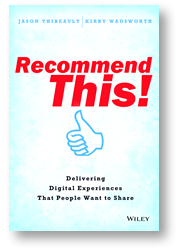
Recommend This!
Delivering Digital Experiences that People Want to Share
Limelight Networks Chief Marketing Officer Kirby Wadsworth ’97 recently ran into a classic marketer’s quandary. He couldn’t put his finger on why he had just paid more for a screwdriver at his local hardware store instead of saving at the big box store down the road. He knew his wife wasn’t too happy about it, but he also knew that he felt good about his purchase. This got him thinking: What was it about that transaction that justified paying a premium?
Realizing that relationship value was bundled into that purchase, Wadsworth and co-author Jason Thibeault started investigating how the relationship value of the face-to-face encounter in the hardware store could be replicated for providers of online services like Limelight.
This realization spawned Recommend This!, a practical guide to building and managing online relationships, which offers marketing professionals effective ways of engaging consumers on a new playing field.
"We had to make our customers want to do business with us, not just buy from us," Wadsworth said. "We needed to transform that amorphous sense of belonging into a concrete, measurable, actionable business metric that our company, and others, could value and optimize."

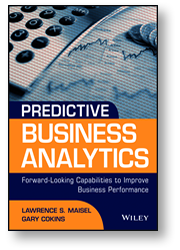
Predictive Business Analytics
Forward Looking Capabilities to Improve Business Performance
In a business environment increasingly turning to big data to improve decision making, Gary Cokins ’74 and co-author, Lawrence S. Maisel, make the case that in order to attain a competitive advantage, mastering all the levers of analytics is crucial.
This doesn’t mean that all companies and executives are embracing analytics and incorporating them into sustainable business strategies.
"There is much confusion and lack of consensus as to what the emerging topics of big data and business analytics are about," Cokins said.
Predictive Business Analytics examines how raw transactional data may be interpreted and employed in executive decision making in order for companies to gain a competitive advantage in the marketplace.
Cokins and Maisel present case studies geared toward executives and managers looking to understand the use of analytics in strategic planning, forecasting demands on an organization, what-if analysis, and driver-based budgeting and rolling financial forecasts. Through these case studies, Predictive Business Analytics provides insight into the mainstream value and practical applications of analytics across entire companies.


